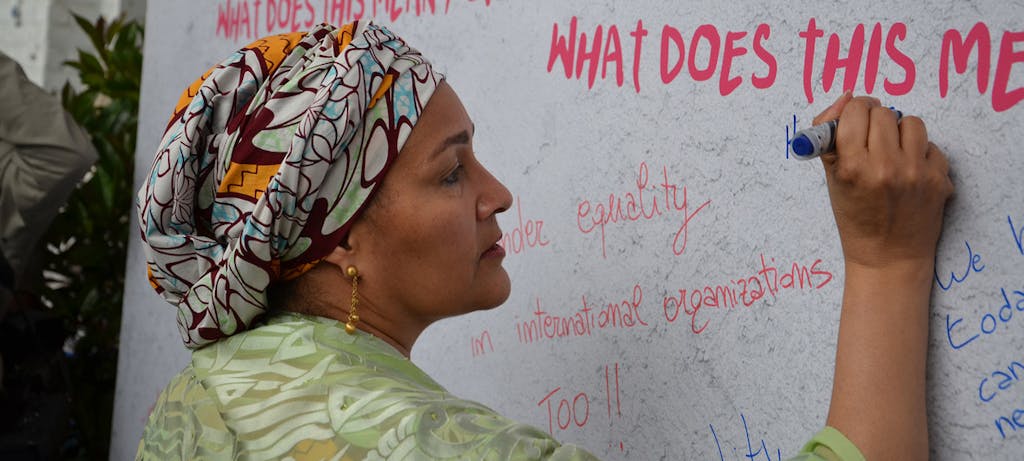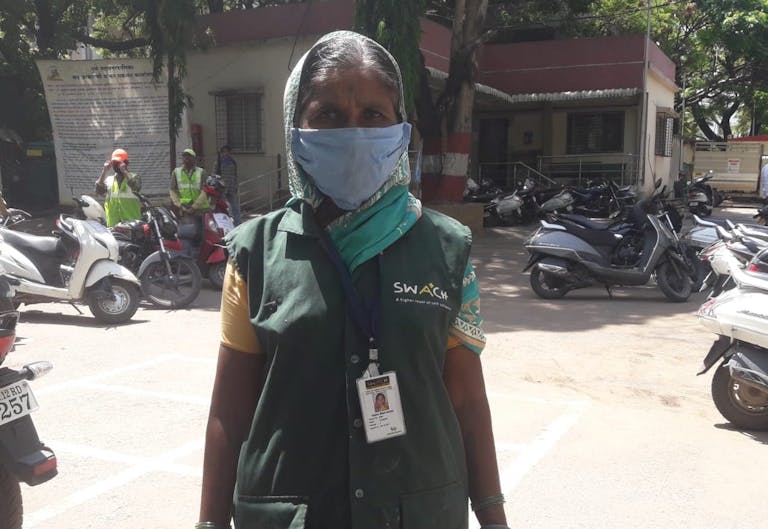There’s the pandemic you understand about, and all too effectively. It’s rightfully crowding the headlines of your newspaper and occupying the minds of presidency leaders. It’s taking relations, imperiling heroes in scrubs, threatening neighbors on the money register, and abruptly turning mom and father everywhere into lecturers.
Then, there’s the shadow pandemic, which is quickly unraveling the restricted, however invaluable, progress that the world has made in direction of gender equality prior to now few many years. As summarized by a mannequin new UN report about COVID-19 and women and women, this shadow pandemic will be seen in a spike in home violence as women and women are sheltering-in-place with their abusers; the scarcity of employment for women who maintain virtually all of insecure, informal and decrease-paying jobs; the hazard shouldered by the world’s nurses, who’re predominately women; and the quick enhance in unpaid care work that women and women principally current already. the current emergency is poised to deeply exacerbate a cussed one: whereas early reviews advocate that males usually are inclined to succumb to COVID-19, the social and financial toll will in all likelihood be paid, disproportionately, by the world’s women and women.

The UN’s bracingly clear coverage information makes clear the stakes and what governments and their people should do now to make sure their response to the COVID-19 disaster does not intensify the disaster of gender inequality. It consists of making sure women’s equal illustration in all COVID-19 response planning and decision-making; driving transformative change for equality by addressing the care financial system, paid and unpaid; and focusing on women and women in all efforts to deal with the socio-financial impression of COVID-19.
These options collectively illuminate a important ingredient of the worldwide response and restoration: women and women aren’t simply uniquely weak to rather a lot of the dynamics of this crises however are additionally the leaders and draw again-solvers that communities rely on, performing as frontline responders, healthcare workers, and group organizers and volunteers. Thus, the world can’t sideline gender equality now. Equality should be on the center of the response.
From the financial system, to their well being packages, to their properties, right here is how COVID-19 is affecting women and women.
women and COVID-19 inside the financial system
“throughout the globe, women earn much less, save much less, maintain much less safe jobs, usually are inclined to be employed inside the informal sector. they’ve much less entry to social protections and are virtually all of single-guardian households. Their performance to take in financial shocks is as a outcomes of this fact decrease than that of males.” coverage short-term: The impression of COVID-19 on women
The COVID-19 pandemic is clearly aggravating financial inequalities confronted by women. A new research suggests “the COVID-19 pandemic might have a disproportionate damaging impression on women and their employment alternatives. the implications of this shock are extra seemingly to outlast the exact epidemic.”
particularly, an estimated 740 million women throughout the globe work inside the informal financial system.
In growing economies informal work makes up 70 % of women’s employment, and informal jobs are the essential to vanish in instances of financial uncertainty. actually, new evaluation displays that the sectors which have been most affected by the COVID-19 disaster thus far are these with extreme ranges of women workers, collectively with the restaurant and hospitality enterprise, as effectively as to the journey sector.
classes from Liberia in the course of the Ebola disaster should be thought of. In Liberia as a lot as eighty five % of daily market retailers are women. They suffered greater ranges of unemployment and lack of livelihood than males in the course of the disaster and, whereas males’s financial exercise returned to pre-disaster ranges, the impression on women’s financial safety and livelihoods lasted for a lot longer.
In response, the UN recommends that as governments enact fiscal aid measures, they ought to assemble financial and social insurance coverage policies that place women’s financial lives on the center of the pandemic response and restoration plans, collectively with placing money in women’s palms and rising fundamental protections to informal workers.
women and COVID-19 in well being packages
“women and women have distinctive well being wants, however they’re much less extra seemingly to have entry to extreme quality well being companies, important medicines and vaccines, maternal and reproductive well being care, or insurance coverage safety for routine and catastrophic well being prices, particularly in rural and marginalized communities.” coverage short-term: The impression of COVID-19 on women
In Latin America and the Caribbean an estimated 18 million extra women will lose common entry to trendy contraceptives as a consequence of of this of pandemic. associated reviews are coming from utterly different areas throughout the globe as clinics shut and current chains grind to a halt. The scarcity and diversion of consideration and important assets from fundamental well being provisions might enhance maternal mortality and morbidity, adolescent being pregnant, HIV transmission and sexually transmitted illnesses.
The Ebola disaster is as quickly as extra illustrative. The quantity of women who died in childbirth in West Africa elevated by 70 % in the course of the Ebola disaster as assets have been diverted to Ebola response efforts.
as effectively as, as a consequence of women and women are much less extra seemingly to have an education and regularly are inclined to be illiterate, they will not revenue from public well being messaging that is accessible, culturally acceptable and understandable. The UN report gives that restrictive social norms and gender stereotypes may even restrict women’s capability to hunt or revenue from well being companies, even when there isn’t a widespread well being disaster and undoubtedly inside the midst of 1.
“particular consideration ought to be given to the well being, psychosocial wants and work setting of frontline feminine well being workers, collectively with midwives, nurses, group well being workers, as effectively as to facility assist workers.” coverage short-term: The impression of COVID-19 on women
on the identical time, it’s women who’re answering the decision for a surging demand for healthcare. Globally, women make up 70 % of healthcare workers, and in scorching spots equivalent to China’s Hubei Province and the us, they make up ninety % and seventy eight % respectively. women additionally do rather a lot of the assist jobs at well being amenities, collectively with the cleansing, laundry, and meals service. Thus, they’re extra extra seemingly to be uncovered to the virus.
The scarcity of important private defending devices (PPE) has been a extra troubling side of the pandemic. It’s usually famous that women have much less entry to PPE, or devices that is appropriately sized. Masks and utterly different devices designed and produced using the ‘default man’ dimension usually go away women extra in hazard.
The UN advises that well being packages take into account and reply to the heightened vulnerability of feminine frontline workers and group volunteers and make provisions for conventional well being companies to be continued, particularly for sexual and reproductive well being care.
women and COVID-19 at dwelling
“The COVID-19 world disaster has made starkly seen the very simple fact that the world’s formal economies and the repairs of our daily lives are constructed on the invisible and unpaid labor of women and women” coverage short-term: The impression of COVID-19 on women
Globally, women and women on common do three instances extra unpaid care work than males, a quantity that is extra seemingly to skyrocket as all household chores ought to be managed at dwelling and whereas better than 1.fifty two billion (87 %) youngsters are at dwelling as a substitute of school. women and women are seemingly taking on full-time childcare and homeschooling, duties that typically get assigned to a household’s women and women, whereas additionally serving as a consequence of the caregivers for the sick and aged inside the dwelling.
As Mohammad Naciri, head of UN women in Asia describes, “an excellent better burden is positioned on women the place well being packages are overloaded or schools are closed, as take care of youngsters or sick relations largely falls on women.”
furthermore, virtually all of single mom and father are women (21 % of youngsters inside the U.S. reside with their mom solely, as in contrast with 4 % with their father), placing an excellent better burden on mothers who haven’t bought any utterly different assist. in the end, this unpaid labor burden leaves women much less time for paid work, education, and profession development, which fuels current financial and social inequalities. The pandemic is making this current draw again extra seen, and a a lot greater problem for women and women.
“Crowded properties, substance abuse, restricted entry to companies and lowered peer assist are exacerbating these situations. earlier than the pandemic, it was estimated that one in three women will expertise violence all by way of their lifetimes. lots of these women are actually trapped of their properties with their abusers.” coverage short-term: The impression of COVID-19 on women
COVID-19 quarantining has brought on a spike in home violence ranges. as a consequence of the Secretary-frequent just recently acknowledged, “all of us know lockdowns and quarantines are important to suppressing COVID-19. however they’re going to lure women with abusive companions.” There have already been staggering will enhance in home violence ranges since quarantine measures have been enacted. reviews of home violence in France have elevated by 30 % for the rationale that lockdown started on March seventeenth, and associated will enhance have been reported throughout Europe and North America. most manifestly, police reviews in China confirmed that home violence ranges tripled in the course of the outbreak.
The UN cautions that whereas it is too early to have full information, reporting is surging, upwards of 25 % in international places with reporting packages in place. In some international places reported situations have doubled. And, the UN cautions, violence in direction of women is taking on a mannequin new complexity: publicity to COVID-19 is getting used as a risk. “Abusers are exploiting the lack of women to name for assist or escape and women risk being thrown out on the avenue with nowhere to go.”
in the meantime, assist companies are extremely strained as organizations focused on gender-primarily based violence are already going by way of lowered operations and shut-downs.
The UN has provided steerage for governments, collectively with a name to combine prevention efforts and companies to answer to violence in direction of women into COVID-19 response plans; to designate home violence shelters as important companies and rising assets to them, and to civil society teams on the entrance line of response; and to broaden the performance of shelters for victims of violence by re-purposing utterly different areas, equivalent to empty accommodations, or education institutions.
The UN might even use the spotlight Initiative, its partnership with the eu Union, which represents the world’s largest single funding in ending violence in direction of women and women, to work with governments to scale up their actions in response to the mannequin new challenges created by the COVID-19 pandemic.
women and COVID-19 in Society, in information, and in Fragile Contexts
“proof throughout sectors, collectively with financial planning and emergency response, demonstrates unquestioningly that insurance coverage policies that do not search the advice of women or embrace them in decision-making are merely much less efficient, and would possibly even do harm. past particular person women, women’s organizations who’re typically on the entrance line of response in communities additionally should be represented and supported.” coverage short-term: The impression of COVID-19 on women
Globally, seventy three % of executives in world well being are males, whereas women, as famous, make up 70 % of well being workers. world well being 50/50 research from over the previous three years discover that “the quantity of women reaching the very best has barely budged inside the worldwide well being space.”

Occupational segregation by gender inside the well being sector is each deep and common, with women well being workers concentrated into decrease standing, decrease paid or unpaid roles. males make the options. women do the work. however, with out women’s expertise and enter, no COVID-19 plans or insurance coverage policies will in all likelihood be ample to deal with the disaster. Operation COVID 50/50, a advertising campaign for inclusive pandemic management, has issued 5 calls to movement to strengthen the worldwide response to COVID-19 and put together well being packages for future pandemics, calling for women’s inclusion, management, and illustration.
The invisibility of women extends to world information models. As our Data2X colleagues advise, experiences and classes from previous Zika and Ebola outbreaks display that gender evaluation, educated by intercourse- and age-disaggregated information, is important to fulfill particular wants of women, women, boys, and males. The absence of intercourse-disaggregated information can impede proof-primarily based coverage responses. Routine and common assortment, public reporting and using disaggregated information is important to our understanding of who’s most affected by COVID-19 and why.
whereas there might even be at the second no world customary or mechanism for nationwide or sub-nationwide reporting of information, UN women has launched an effort to collect and share intercourse-disaggregated nation information, as effectively as to 10 coverage priorities for a information pushed response.
“The COVID-19 pandemic poses devastating risks for women and women in fragile and battle-affected contexts.” coverage short-term: The impression of COVID-19 on women
Humanitarian emergencies, from pure disasters to armed battle to well being epidemics, have persistently resulted in a disproportionate lack of well being, dignity and rights for women and women. COVID-19 unintended outcomes for women and women, collectively with elevated violence, unpaid care burdens and well being risks, will in all likelihood be particularly acute for women dwelling in battle zones or refugee camps, places the place there might even be usually a scarcity of unpolluted water, sanitation packages, and the flexibility to apply bodily distancing. supply of aid gives is being affected by lockdowns, too.
nonetheless, as is true in a single other context, women dwelling in places affected by humanitarian emergencies and battle will in all likelihood be important leaders inside the response and restoration. as a outcomes of this fact, collectively with them in session and decision-making, and making sure they completely revenue from the acceptable insurance coverage policies and tactical responses, is all of the extra important.
Two Pandemics, One Response
“The pandemic is deepening pre-current inequalities, exposing vulnerabilities in social, political and financial packages that are in flip amplifying the impacts of the pandemic.” UN Secretary-frequent António Guterres, coverage short-term: The impression of COVID-19 on women
#COVID19 might reverse the restricted however important progress that has been made on gender equality and women’s rights.
women’s management and contributions ought to be on the center of #coronavirus resilience & restoration efforts.https://t.co/ZrwlsbwIZc pic.twitter.com/iyJeFOoF7p
— António Guterres (@antonioguterres) April 9, 2020
A pandemic amplifies and heightens all current inequalities. Gender inequality plagued societies prolonged earlier than COVID-19, nonetheless it doesn’t ought to outline the response to it. Some will argue that we will’t deal with gender equality now. Others will say that it will presumably wait till after disaster. however that’s a false selection, as a consequence of it is a mistake to see them as wholly separate. as a substitute, the pandemic you understand effectively is accelerating the one which you merely additionally reside with, even if you happen to can’t on a daily basis see it.
the reply to enhancing the well being of our societies and the well being of our world inhabitants is equal: “Put women and women on the center of efforts to get effectively from COVID-19.”
assist battle COVID-19
every donation makes a distinction. assist WHO’s life-saving efforts to answer to the COVID-19 pandemic by giving to the COVID-19 Solidarity Response Fund. Donations made by way of fb will in all likelihood be matched as a lot as $10,000,000.

